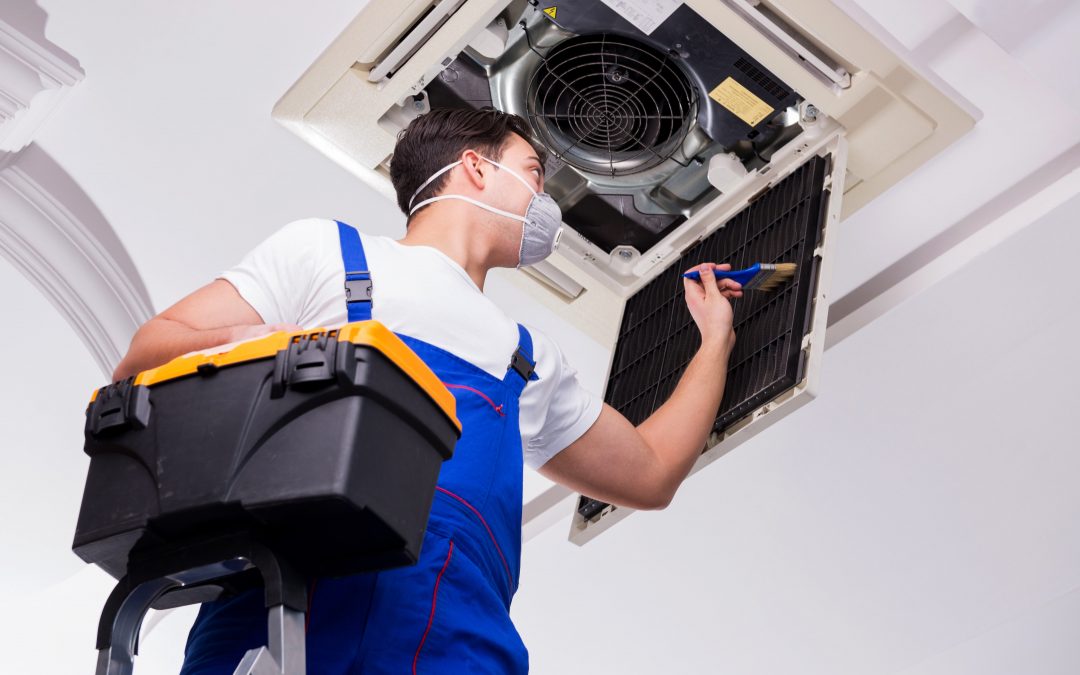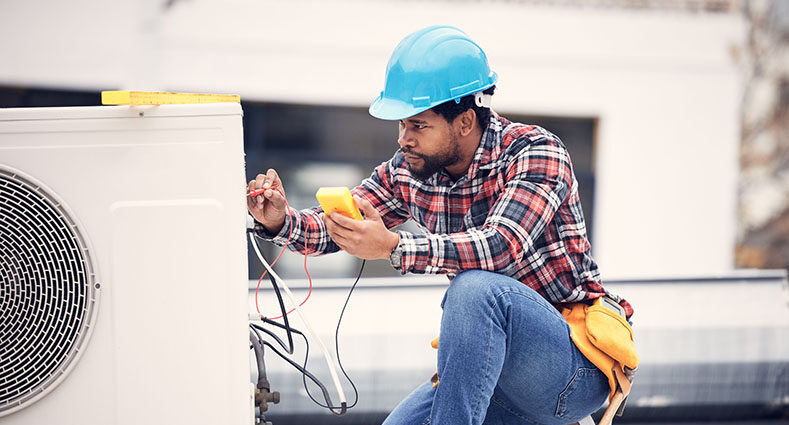Air conditioner repair: common myths debunked
Everything about HVAC: Identifying Common Issues and Effective Air Conditioning Repair Service Approaches
HVAC systems are important for preserving indoor convenience. Comprehending their components and capability is important for determining usual issues. Property owners often deal with problems such as ineffective cooling, weird smells, or climbing power expenses. These indicators can suggest underlying concerns that may call for attention. Discovering do it yourself troubleshooting strategies can be helpful, but knowing when to look for specialist assistance is similarly essential. What actions can be required to ensure durable performance?
Recognizing Your Cooling And Heating System: Components and Performance
A heating and cooling system, frequently thought about the foundation of indoor environment control, is composed of numerous crucial components that collaborate to regulate temperature level and air high quality. The key components include the home heating system, air flow system, and air conditioning unit. The home heating unit, commonly a heating system or central heating boiler, generates warmth throughout cooler months, while the air conditioning unit cools down indoor spaces during the summer season.

Usual Heating And Cooling Troubles Home Owners Encounter
Home owners often encounter several typical HVAC problems, including inconsistent temperature level distribution throughout their space. In addition, uncommon noises throughout operation can show underlying concerns that need interest. Attending to these issues promptly is important for keeping excellent system efficiency.
Irregular Temperature Level Distribution
Numerous households experience the frustrating issue of inconsistent temperature level circulation, where certain spaces feel annoyingly warm while others stay too cool. This trouble typically occurs from a selection of factors, including poor insulation, blocked vents, or an incorrectly sized cooling and heating system. When ducts are not effectively sealed or when furniture blocks airflow, some spaces might receive inadequate cooling. In addition, thermostat placement can significantly impact temperature regulation; a thermostat situated in a sunlit location might misstate the overall temperature level of your house. Regular maintenance, including cleansing filters and making sure ductwork is clear, can help relieve these inconsistencies. Homeowners may also take into consideration zoning systems to much better control temperature levels throughout different locations of the home, advertising an extra comfortable living setting.
Uncommon Noises Throughout Operation
When an a/c system runs, unusual noises can show underlying issues that need attention. Homeowners might run into a series of audios, such as grinding, squeaking, or hissing. Grinding noises commonly signal worn-out bearings or components, while squeaking can suggest loose belts or components requiring lubrication. Hissing may indicate a cooling agent leakage, which can endanger the system's efficiency. Additionally, banging sounds might indicate loose ductwork or an issue with the blower follower. Each of these noises acts as a caution, prompting home owners to explore additionally. Neglecting these signs can lead to even more considerable issues and costly repairs. Normal maintenance and prompt attention to unusual sounds can enhance system durability and performance, making sure a comfortable living environment.
Indications That Indicate Your A/c Demands Repair Service
Just how can one inform if their a/c device wants repair work? Several indications may show underlying problems needing professional interest. If the AC stops working to cool down the area successfully, it might suggest a refrigerant leakage or compressor breakdown. Furthermore, an increase in energy costs without corresponding usage modifications could indicate inadequacy in the system. Homeowners need to likewise be sharp to unusual scents emanating from the unit, which might indicate mold and mildew growth or electrical concerns. If the Air conditioning often cycles on and off, it could be a sign of a malfunctioning thermostat or other mechanical problems. Lastly, the existence of water pooling around the system can suggest a stopped up drain line. Acknowledging these indications early can conserve money and time, making certain that the a/c system runs efficiently and effectively.
DIY Troubleshooting Techniques for Heating And Cooling Issues
When facing cooling and heating issues, homeowners can use a number of do it yourself troubleshooting strategies to determine the trouble. Secret methods include inspecting thermostat setups, examining air filters, and examining drainage concerns. These actions can assist identify typical malfunctions prior to looking for expert help.
Examining Thermostat Setups
What steps should homeowners require to guarantee their thermostat setups are proper? Initially, they should validate the thermostat is readied to the wanted temperature and setting, whether home heating or air conditioning. Checking for a clear display screen and confirming the thermostat is not established to "hold" or "getaway" mode is necessary. House owners must also validate that the thermostat is level and set up in a place without drafts, straight sunshine, or various other temperature affects. Furthermore, recalibrating the thermostat can assist give precise readings. If the thermostat operates on batteries, changing them may settle any type of issues. By systematically assessing these elements, home owners can frequently identify and rectify thermostat-related problems, advertising excellent HVAC system efficiency.
Inspecting Air Filters
Air filters play a crucial duty in maintaining ideal cooling and heating efficiency. They catch dirt, allergens, and other fragments, making sure clean air blood circulation. Gradually, filters can become stopped up, reducing air flow and effectiveness. To inspect air filters, people need to first locate the filter, frequently discovered in the return duct or near the heating system. Once located, they must evaluate the filter's problem-- if it shows up unclean or tarnished, it most likely demands replacement. A lot of filters call for transforming every 1-3 months, relying on use and environmental aspects. Normal evaluation and timely replacement of air filters not only improve air quality but also lengthen the life-span of a/c systems, protecting against possible malfunctions and costly fixings.
Reviewing Drain Issues
Exactly how can house owners efficiently recognize and resolve drainage concerns within their cooling and heating systems? They ought to examine the condensate drainpipe line for blockages or clogs, which can lead to water buildup. Home owners may utilize a wet/dry vacuum to get rid of any debris obstructing the line. Next, inspecting the drain pan for rust or leakages is essential, as a damaged frying pan can cause water to overflow. Regular cleansing of the drain line with a mix of vinegar and check here water helps stop future clogs. Additionally, guaranteeing proper incline of the drain line advertises reliable water flow. If these DIY methods do not settle the problem, seeking advice from a professional cooling and heating professional may be needed to avoid prospective water damages and system failing.
When to Call a Specialist for Air Conditioning Repairs

While some AC issues can be dealt with through website do it yourself methods, there are circumstances where calling a specialist comes to be necessary. Homeowners should seek skilled support when they encounter consistent issues, such as insufficient cooling, odd noises, or unusual odors rising from the unit. These signs and symptoms might indicate deeper concerns that call for specialized expertise and tools to detect and repair appropriately.

Preventative Upkeep Tips for Heating And Cooling Long Life
Normal preventative upkeep can substantially boost the longevity of cooling and heating systems. House owners must schedule yearly evaluations by qualified technicians to assess system performance and identify possible problems. Frequently altering or cleaning air filters is crucial, as this guarantees proper airflow and minimizes strain on the system. On top of that, checking and securing ductwork prevents power loss and enhances overall efficiency.
It is likewise advisable to maintain the outdoor system free from particles and vegetation, permitting peak air movement and warm exchange. Property owners need to inspect the condensate drain for obstructions to stay clear of water damages and mold growth. Additionally, keeping proper thermostat setups and using programmable choices can enhance power effectiveness. Lastly, documenting maintenance activities assists track service history and can assist in recognizing persisting concerns (HVAC company). By following these preventative actions, people can maximize the effectiveness and life expectancy of their a/c systems
Often Asked Concerns
How Frequently Should I Change My Heating And Cooling System Filters?
Heating and cooling system filters must commonly be replaced each to 3 months, relying on usage, filter kind, and environmental elements. Regular substitute helps maintain performance and air high quality, making sure peak system efficiency throughout the year.
What Size A/c System Do I Required for My Home?
To identify the suitable HVAC system dimension for a home, one should take into consideration square footage, insulation top quality, and regional climate. Consulting a professional can assist ensure optimal efficiency and convenience for the certain living area.
Are There Eco-Friendly HVAC Options Available?
Yes, environment-friendly HVAC choices are available, consisting of energy-efficient heatpump, solar-powered systems, and geothermal heating. These options reduce power consumption and environmental effect, promoting sustainability while keeping effective environment control for property and business spaces.
Just How Can I Improve My HVAC System's Power Effectiveness?
To improve a/c energy efficiency, one can routinely keep the system, seal air leaks, mount programmable thermostats, utilize energy-efficient filters, and guarantee ample insulation throughout the home to lower power usage and enhance efficiency.

What Is the Ordinary Lifespan of an A/c System?
The ordinary life expectancy of a cooling and heating system normally ranges from 15 to 25 years, depending upon elements such as upkeep, use, and the quality of more info installation. Normal upkeep can significantly prolong its operational durability.
Final thought
In summary, a detailed understanding of HVAC systems equips homeowners to recognize common problems and address small troubles efficiently. Identifying indicators of malfunction, using DIY troubleshooting methods, and focusing on normal maintenance can improve system performance and effectiveness. When encountered with complicated repairs, employing specialist help is essential to guarantee security and long life. By promoting recognition and positive care, individuals can take pleasure in a comfortable interior atmosphere while reducing unanticipated costs connected with cooling and heating failings.